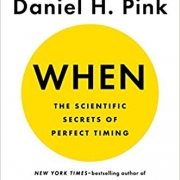Picture one person your work will help
Do you sometimes get stuck in the middle of writing something? Writer’s block and challenges with time  management are common problems. I found a tip that may help in When: the scientific secrets of perfect timing by Daniel Pink. The book discusses how to act at the right times, and how to overcome challenges at different points.
management are common problems. I found a tip that may help in When: the scientific secrets of perfect timing by Daniel Pink. The book discusses how to act at the right times, and how to overcome challenges at different points.
One person can help
One of Pink’s tips aims to help people who are stuck at a midpoint. “Picture one person who will benefit from your efforts. Dedicating your work to that person will deepen your dedication to your task,” he says.
I’ve met many advisors who struggle with completing blog posts, quarterly letters, or white papers. If you’re among them, would you feel more motivated to finish your blog post about 529 plans when you think about your meeting next week with the Millers, who want to help fund their grandchildren’s education? What if you think about a prospect with a highly concentrated stock portfolio, when you work on your white paper about diversification? Those thoughts would make a difference for me.
Added benefit for writers
Thinking of one person in your target audience is a doubly helpful tip for writers. Why? Because thinking about your reader will help you to write in a way that’s more reader-friendly than if your audience seems faceless to you. For example, you may remember that Jill Brown didn’t understand that technical term you used in explaining something to her.
More ways to overcome writer’s block
If you’re looking for more tips, here are my posts on managing writer’s block and distractions:
- 15 minutes to busting your writer’s block
- Force yourself to write or wait for inspiration?
- “Deep Work” rules to help you write more
- Break your writer’s block with Robert Benson and Eric Maisel
Your ideas?
How do you keep yourself moving when you feel stuck in a project? I’m always interested in learning from you.
Disclosure: If you click on the Amazon link in this post and then buy something, I will receive a small commission. I link only to books in which I find some value for my blog’s readers.
The image in the upper left is courtesy of Miklós Barabás [CC BY-SA 4.0]
